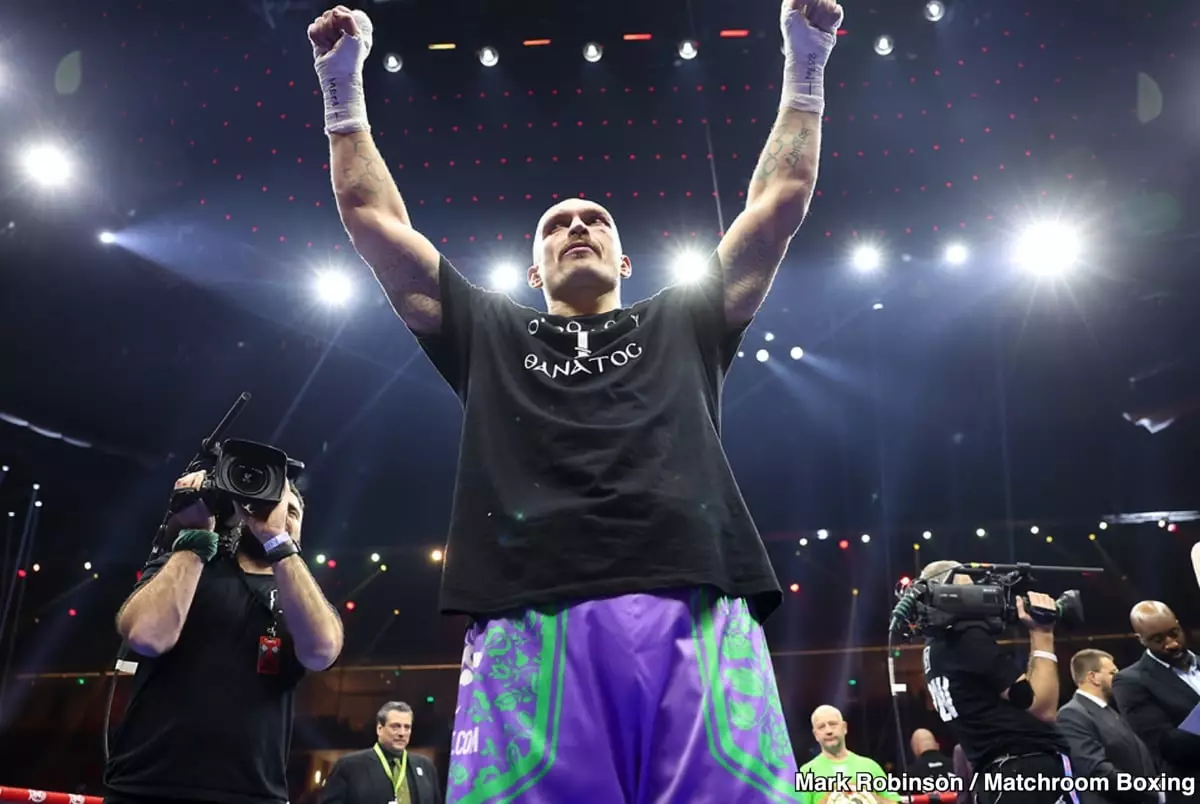The boxing community often oscillates between reverence and skepticism when it comes to evaluating the legacy of its athletes. In recent weeks, admiration for Oleksandr Usyk has erupted, with commentators and fans alike lauding the Ukrainian as a certified all-time great in the sport of boxing. However, standing in stark contrast to that sentiment is the perspective of boxing analyst and former champion Tim Bradley, who has openly disputed Usyk’s status as one of the sport’s legends. The clash of opinions raises critical questions about what it truly means to be considered an all-time great in the world of boxing.
Bradley’s Skepticism
Tim Bradley is no stranger to combative discussions in the boxing realm. As a former champion and experienced commentator, his insights generally stem from a profound understanding of the sport. However, in his dismissal of Usyk’s all-time great status, Bradley presents a perplexing argument. By stating that Usyk’s achievements—specifically his seven heavyweight bouts—are insufficient for greatness, he effectively undermines the significance of those very accomplishments. Becoming the unified heavyweight champion within such a limited number of fights is, in itself, a remarkable feat that demands recognition.
Bradley seems to imply that Usyk’s heavyweight legacy is incomplete until he has defeated every notable heavyweight contender available. However, the reality is complicated; simply possessing an extensive record or defeating numerous fighters does not automatically solidify one’s status as an all-time great. Usyk’s victories over established fighters like Anthony Joshua and Tyson Fury showcase his elite skill set and tactical genius.
The question remains: what constitutes an all-time great boxer? In many sports, legacy is built on consistency, longevity, and the ability to triumph against a multitude of opposition. Traditional metrics often include the number of championships won, the caliber of opponents defeated, and overall skill demonstrated in the ring. In Usyk’s case, his two-time victories over Joshua and his triumph over Fury signify unequivocal success against recognized giants in the heavyweight division.
Moreover, Usyk’s storied amateur career, where he amassed an impressive record of 335 wins to just 15 defeats, further contributes to his claim as one of the exemplary talents of his generation. His transition from the cruiserweight to heavyweight division, where he secured all titles in his weight class, adds a layer of complexity to Bradley’s dismissal of Usyk’s achievements.
The boxing landscape has evolved, and with it comes a shift in how greatness is perceived. Gone are the days when competitors were required to fight every contender within their weight class to solidify their status. Fighters today often face a plethora of obstacles, including financial considerations and promotional entanglements, which can inhibit matchups between champions and challengers. In this modern era, Usyk has faced the challenges of navigating not only a turbulent professional environment but also personal tribulations, including ongoing geopolitical strife within his homeland.
Usyk’s willingness to face top competitors in hostile settings—be it fighting Joshua on British soil or overcoming Fury in Saudi Arabia—demonstrates his relentless commitment to the sport. These fights encapsulate not just skill but also courage, as Usyk has fought literally in the shadows of adversity.
The Silent Majority
It’s also essential to recognize that opinions diverge within the boxing community. While Bradley carries significant weight as an analyst, many others, including revered figures like Adam Smith and Carl Froch, recognize Usyk’s brilliance and contribution to the sport. Their thoughts reflect a growing consensus that achievement, tenacity, and exceptional talent all contribute to the narrative of one’s legacy.
The notion that Usyk must face every single contender to solidify his legacy seems outdated and overly critical. The willingness to step into the ring against top-tier adversaries such as Joshua and Fury is noteworthy enough to justify a place among boxing’s elite.
A Case for Usyk’s Greatness
As of now, Usyk’s professional record stands at 22-0 with 14 knockouts. He has defeated prominent fighters across the globe, claiming titles from numerous organizations. Notably, he has also participated in the World Boxing Super Series, asserting his dominance in cruiserweight. The intricate narrative surrounding Usyk’s career is enriched by these achievements—elements that transcend mere numbers on a scorecard.
While Tim Bradley’s criticism offers a unique perspective steeped in traditional metrics of greatness, it may overlook the broader painted canvas of Usyk’s career. The clear dynamism of his accomplishments in boxing positions Oleksandr Usyk not just as a significant fighter of his era, but as an athlete deserving of all-time great status. His ongoing journey in the sport serves as a reminder: greatness in boxing cannot always be captured in explicit terms, often requiring a deeper exploration of context, accolades, and the spirit of competition that defines the sport.


Leave a Reply